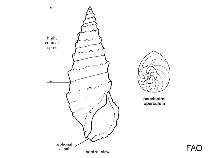Rhinoclavis diadema Houbrick, 1978
| Native range | All suitable habitat | Point map | Year 2050 |

|
| This map was computer-generated and has not yet been reviewed. |
| Rhinoclavis diadema AquaMaps Data sources: GBIF OBIS |
Google image | No image available for this species;
drawing shows typical species in Cerithiidae.
Classification / Names Common names | Synonyms | CoL | ITIS | WoRMS
Gastropoda | Not assigned | Cerithiidae
Environment: milieu / climate zone / depth range / distribution range Ecology
Benthic; depth range 0 - 7 m (Ref. 75835). Tropical
Distribution Countries | FAO areas | Ecosystems | Occurrences | Introductions
Western Pacific: Guam, Japan and Kiribati.
Length at first maturity / Size / Weight / Age
Maturity: Lm ? range ? - ? cm
Life cycle and mating behavior Maturity | Reproduction | Spawning | Eggs | Fecundity | Larvae
Main reference
References | Coordinator | Collaborators
Smith, B.D. 2003 Prosobranch gastropods of Guam. Micronesia 35-36:244-270. (Ref. 3116)
IUCN Red List Status
(Ref. 130435: Version 2025-1)
CITES status (Ref. 108899)
CMS (Ref. 116361)
Threat to humans
Human uses
| FishSource |
Tools
More information
Diet composition
Food consumption
Predators
Max. ages / sizes
Length-weight rel.
Length-length rel.
Length-frequencies
Mass conversion
Abundance
Internet sources
BHL | BOLD Systems | CISTI | DiscoverLife | FAO(Publication : search) | Fishipedia | GenBank (genome, nucleotide) | GloBI | Gomexsi | Google Books | Google Scholar | Google | PubMed | Tree of Life | Wikipedia (Go, Search) | Zoological Record



